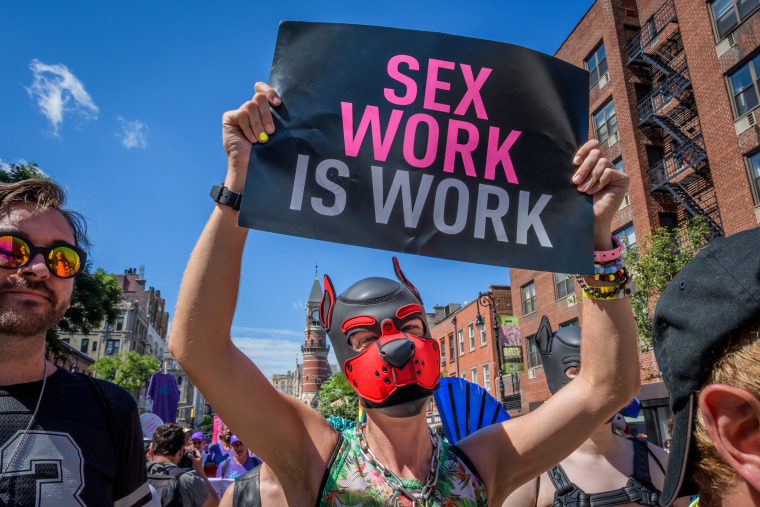Transgender advocates in New York are celebrating after the Manhattan District Attorney’s Office announced it will no longer prosecute sex workers.
“Over the last decade we’ve learned from those with lived experience, and from our own experience on the ground: criminally prosecuting prostitution does not make us safer, and too often, achieves the opposite result by further marginalizing vulnerable New Yorkers,” Manhattan District Attorney Cyrus Vance Jr. said Wednesday in a statement.
The DA also announced approximately 6,000 prostitution-related open cases will be dismissed, including 900 cases dating back to the 1970s.
Cecilia Gentili, founder of Transgender Equity Consulting, in the statement called the decision “one of the most significant steps taken Nationally in the effort to stop criminalizing sex work.”
“This resolute action to actively decriminalize sex workers is the kind of change our community has been hoping for, advocating for, for decades,” Gentili said.
Trans people — especially trans women of color — are more likely to engage in sex work: The 2015 National Transgender Discrimination Survey found nearly 11 percent of transgender Americans reported having participated in the sex trade, including almost 40 percent of Black respondents and 33 percent of Latinos.
“For many transgender people, the sex trade can offer greater autonomy and financial stability compared to more traditional workplaces, with few barriers to entry,” the report read. “However, economic insecurity and material deprivation can increase one’s vulnerability to harm and decrease the ability to make self-determined choices.”
Many turned to it after facing rejection, discrimination and harassment in the traditional workforce.
Of the trans sex workers surveyed, almost 70 percent reported losing out on a promotion, being fired or facing other negative workplace outcomes as a result of their gender identity. Those who lost a job due to anti-trans discrimination were nearly three times as likely to engage in the sex trade, the survey found.
Vance described the decision to end prosecutions as an outgrowth of the office’s efforts to connect individuals arrested for prostitution with social services rather than pursue criminal charges.
“Now, we will decline to prosecute these arrests outright, providing services and support solely on a voluntary basis,” he said in the statement.
Vance called the backlog of cases, many going back decades, “a relic from a different New York, and a very real burden for the person who carries the conviction or bench warrant.”
The news comes just months after the New York Legislature repealed a law prohibiting loitering for the purpose of prostitution that critics say was disproportionately enforced against transgender women of color.
More than 5,000 of the cases dismissed this week were related to that statute, nicknamed the “walking while trans” ban.
“When you are an undocumented trans sex worker, having an arrest on your record can impact your efforts at immigration,” said Bianey Garcia, an advocate with the grassroots social justice group Make the Road New York. “It can hurt your chances at getting a job or a place to live.”
Garcia, a former sex worker, said the district attorney’s announcement “is proof the organizing we’re doing, the speaking out — it’s working.”
Vance’s office will continue to prosecute other crimes related to prostitution, including sex trafficking, patronizing sex workers and promoting prostitution, The New York Times reported.
Manhattan joins Baltimore, Philadelphia, San Francisco and other jurisdictions that decline to prosecute sex workers.
Earlier this year, District Attorneys in Brooklyn, Queens and the Bronx also moved to dismiss all outstanding prostitution and loitering-related cases, indicating they will no longer prosecute such charges.
In the late 1990s and early 2000s, trans activist and filmmaker Kristen Lovell was a sex worker in New York City’s Meatpacking District. She called the decision to stop prosecuting “monumental” for the trans community.
“Now, in the land of trans bans, we don’t have to prosecute people for trying to make a living,” she said.
Lovell said she was arrested dozens of times under the repealed “walking while trans” law.
“I’d just get off the subway and I’d be in cuffs,” she said. “We couldn’t even congregate on Christopher Street, an area that has historically been a safe space for our community. ... Being a Black trans woman, you’d be chased out of the neighborhood.”
Police frequently assume transgender women — particularly trans women of color — are engaging in prostitution, according to the 2015 U.S. Transgender Survey, which found a third of Black trans women and 30 percent of multiracial women said an officer had assumed they were sex workers.
“We’ve seen trans people call the police and the first question they’re asked is, ‘What are you doing here? Why are you dressed like that?’ instead of finding out what help they need,” Garcia said. “You just survived a crime, and they’re profiling you.”
The U.S. Transgender Survey also found nearly 9 out of 10 respondents who interacted with the police either while doing sex work or being incorrectly accused of being sex workers reported being harassed, attacked or sexually assaulted by law enforcement.
In a report on violence against the trans community, the National Center for Transgender Equality called police abuse and dangerous conditions fostered by criminalization “the primary threat to the safety of sex workers.”
But ending prosecutions is just the start of repairing the relationship police have with the trans community, Lovell said.
“Trust has to be earned,” she said. “It’s going to take a while to build that. They need to reimagine policing.”
Like others, Lovell supports decriminalizing sex work nationwide. But she also wants more funding to enable trans women to leave the industry.
“For those who want to get out, there needs to be more job training, more mental health services,” she said. “And for those comfortable doing the work, it shouldn’t be demonized. It’s a job like any other.”
